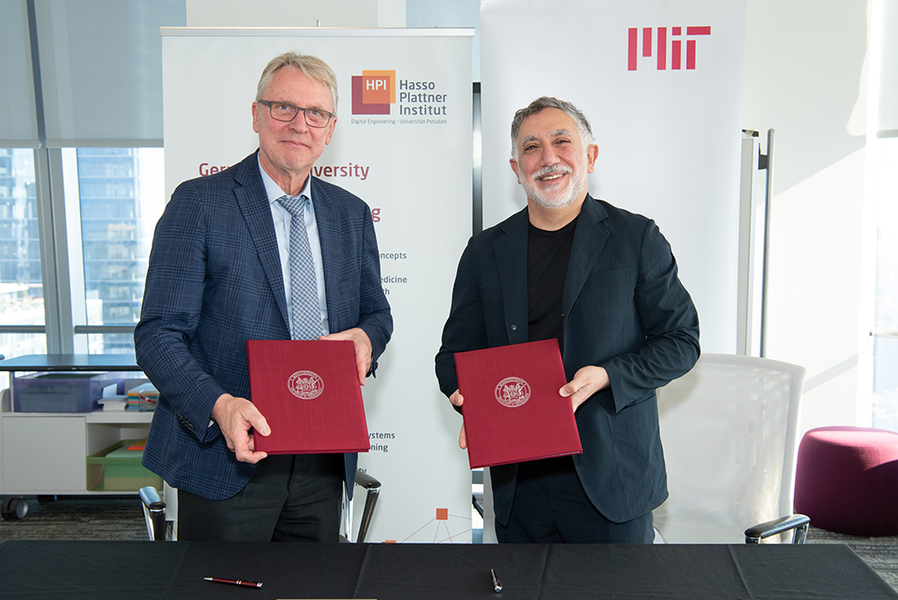At a signing ceremony last week, leaders from the MIT School of Architecture and Planning, the MIT Morningside Academy for Design (MAD) and the Hasso Plattner Institute (HPI) announced the Hasso Plattner Institute-MIT Research Program on Designing for Sustainability. This research collaboration, funded by the Hasso Plattner Foundation, is an eight-year program to drive joint scientific research at both institutes in sustainable design, innovation, and digital technologies, as well as in translating research results into practice.
Through this engagement, MIT and HPI aim to tackle global challenges as expressed in the United Nations Sustainable Development Goals (SDGs). The program will connect faculty and students from both institutions, with the intention of having the most significant possible societal impact.
“We are very pleased to embark on this significant research initiative with the Hasso Plattner Institute,” says Hashim Sarkis, dean of the MIT School of Architecture and Planning. “Addressing the world’s large-scale societal challenges requires work across disciplines and institutions, and we welcome the opportunity to engage with this leading research center. We are grateful to the Hasso Plattner Foundation for making this collaboration possible.”
The MIT Morningside Academy for Design, a new Institute-wide hub for cross-disciplinary education, research, and innovation, will administer the collaboration and ensure the program's reach across MIT. Faculty leaders at MAD and HPI will oversee the research funding application process as well as other activities of the program.
The Hasso Plattner Institute, based in Potsdam, Germany, is an international center for digital engineering, advancing research and education in IT systems engineering, data engineering, cyber security, entrepreneurship, and digital health.
The HPI School of Design Thinking is Europe’s first innovation school for university students. PhD candidates conduct research at the HPI Research Schools in Potsdam and its branches in Cape Town, Haifa, Irvine, and Nanjing.
“This cooperation brings new opportunities for research and our students,” says Christoph Meinel, professor and managing director at HPI, and head of the department of Internet Technologies and Systems. “It will give impulses to academia as well as into practice. At the same time, it will closely connect PhD students of both institutions through joint research in workshops and exchange programs.”
Program participants will conduct research in basic and applied design thinking and innovation. Design is understood broadly to include design research and thinking, as well as the use of creativity in addressing challenges in disciplines such as computer science and entrepreneurship, all with consideration of human and social impacts.
Funded researchers study the complex interaction between members of multidisciplinary teams challenged to deliver breakthrough product, service, and business-model sustainable design innovations. Applied design thinking research will focus primarily on topics from among the 17 SDGs, including health, education, energy, and climate action. Innovation research is targeted on the creation of high-impact products and startups (product and venture design) that translate research into practice.
“We are thrilled to collaborate with HPI to apply the power of design to sustainability and digital technologies,” says John Ochsendorf, the Class of 1942 Professor and a professor of architecture and of civil and environmental engineering at MIT, and director of the Morningside Academy. “By working together, the research talents of students and other researchers at HPI and MIT can accelerate design innovations for a low-carbon economy.”
“Alongside artificial intelligence, design research is a key driver for innovation in sustainability,” says Ralf Herbrich, professor and managing director of HPI. He also serves as head of the department of AI and Sustainability at HPI and a steering committee member. “Bringing talented PhD students of our two institutions together that are committed to the SDGs will foster breakthroughs in this societally very important area.”
The Hasso Plattner Foundation supports the research collaboration that is set up over eight years, with an interim evaluation after four years. The funded program will entail semi-annual research workshops, quarterly virtual seminars, and student exchanges between both institutes.







